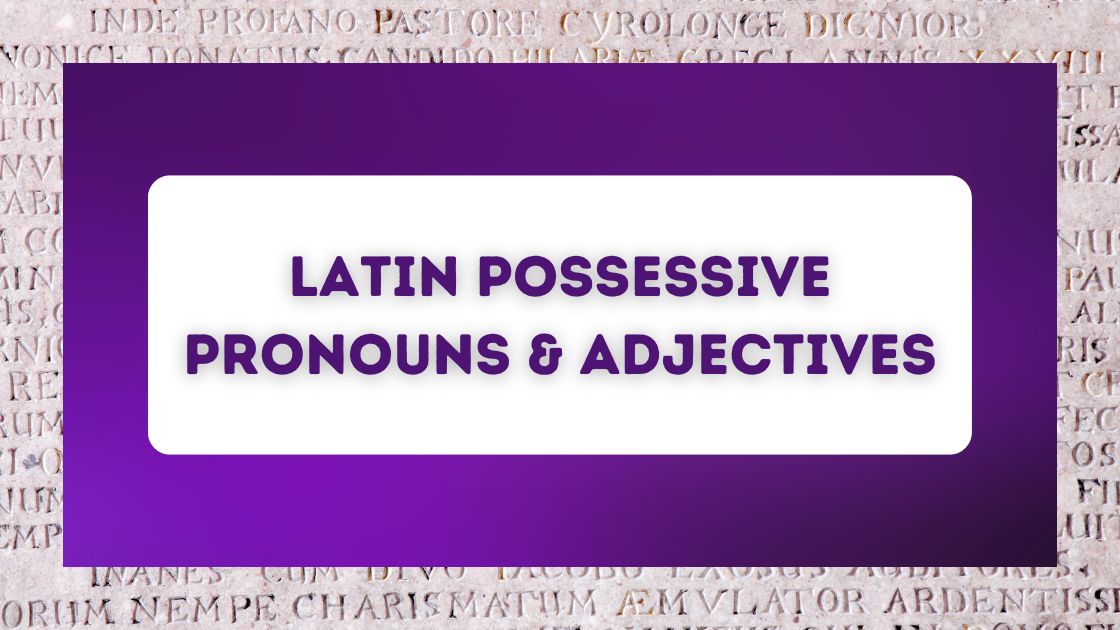A Guide to Latin Possessive Pronouns & Adjectives
In this post, you will learn everything you need to know about Latin possessive pronouns and adjectives. We will cover definitions, meanings, and uses with lots of example sentences.
When we discuss possession in Latin, you may instinctively think of the genitive case. And this is good, since the genitive’s prime function is to indicate possession.
But when you want to make a pronoun possessive, things work a little differently. This post will explain how to say my, your, his, her, its, and more in Latin!

This post may contain affiliate links and I may receive a commission, at no extra cost to you, if you make a purchase through a link. See my disclosures for more details.
Latin Possessive Pronouns vs. Possessive Adjectives
Before we talk about the details, it is important to establish the big picture. What are possessive pronouns, and how are they different than possessive adjectives?
The easiest way to think about it is that possessive adjectives always accompany a noun, while possessive pronouns can stand on their own. Consider the following sentences.
My dog is happy. = Canis meus est laetus. (possessive adjective)
That dog is mine. = Ille canis est meus. (possessive pronoun)
My sister is happy. = Soror mea est laeta. (possessive adjective)
Your sister is taller than mine. = Soror tua est altior quam mea. (possessive pronoun)
The distinction is quite easy to see in English thanks to the two different forms, my (adjective) and mine (pronoun). In Latin, the same word – meus, a, um – serves as both adjective and pronoun.
We have this ambiguity in English with his and its, both of which can be either an adjective or a pronoun.
His dog is happy. (possessive adjective)
That dog is his. (possessive pronoun)
To be honest, in Latin the difference is insignificant for most learners.
Textbooks may call words like meus, a, um either adjectives or pronouns, but they are referring to the same thing. I will use the term “possessive adjective” throughout the rest of the post.
If you are not grammatically inclined, you do not need to worry about the distinction. The most important thing is to know that possessive adjectives like meus, a, um “my/mine” can be used in different ways.
In this post, we will cover how to say my/mine, your/yours, and our/ours as well as his, her/hers, its, and their/theirs. This involves two Latin structures:
- possessive adjectives/pronouns that agree with their noun in gender, number, and case
- the genitive of personal pronouns that do not change to agree with their noun
#2 is a bit complicated, and I will give more details below.
Latin Possessive Adjectives: 1st and 2nd Person
In this section, we will discuss four important Latin possessive adjectives.
- meus, a, um = my / mine
- tuus, a, um = your / yours (singular)
- noster, nostra, nostrum = our / ours
- vester, vestra, vestrum = your / yours (plural)
These possessive adjectives – like all Latin adjectives – always agree with the noun they modify in gender, number, and case. No exceptions.
What matters is the gender, number, and case of the thing possessed, not the gender of the person possessing. Watch how noster, nostra, nostrum changes its ending based on the noun it modifies.
Nostrum librum nōn videt. = He does not see our book.
In nostrā urbe sunt multī canēs. = There are many dogs in our city.
Amīcī nostrī in hortō sedent. = Our friends are sitting in the garden.
But what about when the adjective stands alone and acts as a pronoun? Even then, the pronoun has to have the same gender and number of the thing it is referring to (the thing possessed). The case depends on the specific context.
If I say, “Ours is good,” the translation of “ours” into Latin will change based on what “ours” refers to.
Mihi nōn placet urbs tua, sed nostra est bona. = I don’t like your city, but ours is good.
Mihi nōn placet canis tuus, sed noster est bonus. = I don’t like your dog, but ours is good.
In the first example, nostra is short for nostra urbs “our city.” Since urbs is feminine and singular, nostra ALSO has to be feminine and singular. Nostra is nominative because it is the subject of the verb est.
In the second example, noster is short for noster canis “our dog.” Canis is masculine and singular, so noster must be, too. Noster is nominative because it is the subject of the verb est.
Basically, these possessive adjectives behave just like normal adjectives in Latin. They are declined like 1st and 2nd declension adjectives, so you do not need to learn any new endings.
If you aren’t sure what these endings are, or if adjectives aren’t your strong suit, then check out my post on Latin adjectives for beginners.
Before we move on, I want to point out two important details.
First, these adjectives can also act as reflexive possessives. This just means that meus, a, um can mean “my own,” tuus, a, um can mean “your own,” and so forth.
Second, make sure you always use these adjectival forms to express possession. Do not the genitives of the personal pronouns ego, tū, nōs, and vōs. These genitives are only used for the partitive and the objective genitive.
👉 Curious about the genitive of personal pronouns? This post covers the topic in detail.

His, her, its, and their in Latin
So far you have learned how to say my, your (singular and plural), and our in Latin. But what about his, her, its, and their?
This is where it gets a bit more complicated. The way you translate these possessives into Latin depends on whether they are reflexive or not.
Basically, reflexive possessives refer back to the subject of the sentence. In English, we add “own” after the possessive to get “his own”, “her own,” etc.
👉 Do you need a refresher on reflexives? My post on reflexive pronouns has more details.
In Latin, there is one reflexive possessive adjective for the third person: suus, a, um. For non-reflexive possessive adjectives, you use the genitive of the personal pronoun.
If this sounds confusing, don’t worry! We will go through everything with lots of examples below.
Suus, a, um
Suus, a, um is a reflexive possessive adjective of the 3rd person. In simpler terms, suus, a, um has multiple possible meanings.
- his own
- her own
- its own
- their own
The precise meaning of the adjective depends on the subject of the sentence.
Look at the following example sentences. They are exactly the same in Latin, except that the subject has changed. The change in subject affects how we translate suam (the reflexive adjective) into English.
Puella fēlem suam amat. = The girl loves her own cat.
Puer fēlem suam amat. = The boy loves his own cat.
Puellae fēlem suam amant. = The girls love their own cat.
Suam always refers back to the subject of the sentence, no matter what gender and number the subject is. Suam is feminine accusative singular because it describes fēlem “cat”, which is a feminine noun in the accusative singular.
Thus suus, a, um also follows the number one rule of adjectives: they have to agree with the noun they modify in gender, number, and case.
Here are some more examples of suus, a, um in action.
Cūr mīles in sellā suā nōn sedet? = Why isn’t the soldier sitting in his (own) chair?
Mater librōs suōs in mēnsā pōnit. = The mother puts her (own) books on the table.
Populus ducem suum timet. = The people fears its (own) leader.
Discipulī dōnum magistrō suō dedērunt. = The students gave a gift to their (own) teacher.
Just like the possessive adjectives mentioned above, suus, a, um declines like a 1st and 2nd declension adjective.
Eius, eōrum, & eārum
Suus, a, um only works when the possessive adjective is reflexive. If it is not, then you need to use the genitive singular of the 3rd person personal pronoun.
The 3rd person personal pronoun is is, ea, id “he, she, it.”
👉 If you don’t quite remember what is, ea, id is used for, my post on personal pronouns will help.
For right now, here are the forms you need to know:
- eius = his, her/hers, its
- eōrum = their/theirs (referring to a group of men or a mixed group)
- eārum = their/theirs (referring to a group of women)
You use these pronouns when the possessive does not refer back to the subject of the sentence.
Iūlia adest, sed frātrem eius nōn videō. = Julia is here, but I don’t see her brother.
In eōrum hortō sunt multī flōrēs. = There are many flowers in their garden.
Magistrās videō, sed ubi sunt eārum discipulī? = I see the (female) teachers, but where are their students?
Eius, eōrum, and eārum do not change to match the case, number, or gender of the nouns they depend on. You will always see the exact same forms: eius, eōrum, and eārum.
This makes sense, because these are not adjectives like the other possessives we have learned. Instead, they are pronouns in the genitive case.
Reflexive vs. Non-Reflexive Possessive Adjectives
Now let’s compare the uses of suus, a, um and eius, eōrum, and eārum. Seeing some sentences side-by-side will help to clarify the very different contexts that they appear in.
Vir uxōrem suam amat. = The man loves his (own) wife. (reflexive)
Vir uxōrem eius amat. = The man loves his/her (someone else’s) wife. (non-reflexive)
In English, we can’t really distinguish between his own and his (someone else’s). We can add own to emphasize the reflexivity, but if we use his, the meaning is ambiguous.
This is not the case in Latin. In the first sentence, the man is in a happy marriage. In the second, he is not, because eius cannot refer back to vir. The man loves someone’s wife, but not his own.
Here are some more comparisons.
Cūr rēgīna mīlitēs suōs semper laudat? = Why does the queen always praise her (own) soldiers?
Cūr rēgīna mīlitēs eius semper laudat? = Why does the queen always praise her/his (someone else’s) soldiers?
Agricolae cum animālibus suīs vēnēre. = The farmers came with their (own) animals.
Agricolae cum animālibus eōrum vēnēre. = The farmers came with their (someone else’s) animals.
Final Thoughts on Latin Posessives
Latin possessive pronouns and adjectives can be confusing because they don’t match up exactly with English possessives. But with time, you will become familiar and even comfortable with the Latin conventions.
Before I close this post, I do want to mention one more thing. This is that reflexive possessives are often omitted in Latin.
So, if I say, “I love my husband,” this would be virum meum amō. But in Latin, you don’t need to use meum unless you are being emphatic.
If you say, “Virum amō,” the assumption is that you love your husband, and not someone else’s. Here is another example:
- Iūlia frātrem vīdit. = Julia saw her brother.
The “her” is not explicit in Latin. We don’t need to add suum, because in Latin, the default is to assume a reflexive pronoun.
After all, if someone says virum amō or frātrem vīdī, most of the time they mean their own husband or their own brother. It’s more efficient to leave out the explicit meum.
And there you go – now you know all about Latin possessive pronouns and adjectives! You may also like the following posts on pronouns:
Personal Pronouns (Ego, tū, etc.)
Reflexive Pronouns (Suī and more)

Salvē, Livia
In the Reflexive vs Non-Reflexive section of your recent post on possessive pronouns and adjectives, you chose to use the verb vēnēre, rather than vēnērunt. Will you point me to where that choice is explained?
Regards,
Tacitus
Livermore, Calif
Salvē, Tacite! This is an excellent question. Basically, -ēre was the first form of the 3rd person plural perfect ending in Latin, but it had started to disappear in favor of -ērunt by the classical period. BUT it never quite vanished, partially because some authors would use the form to achieve an archaizing effect, and mostly because it was very useful in poetic meter (long short instead of the long long of -ērunt).
Depending on what texts you are reading, -ēre may appear much more frequently than -ērunt. For instance, Vergil uses -ēre 231 times and -ērunt only 29 times. Caesar and Cicero, on the other hand, use -ērunt almost exclusively.
If you want to read more about this, there is an article from the 1930s by Charles Bauer called “The Latin Perfect Endings: -Ere and -Erunt.” This is the source of the data I gave above.
I chose to use -ēre here because students often forget that it exists, and I want to remind them.
very nice but maybe you’re muddling attributive and predicative adjectives with pronouns. mine is the best would be mine as a pronoun – the book is mine would be predicative adjective
Hi Paul, thanks for stopping by! My initial thought was also that “mine” would be a predicate adjective in “the book is mine,” but when I did more research, I discovered that grammarians tend to treat it as a pronoun. (Sources are Cambridge Dictionary, Grammarly, Collins Dictionary, etc.)
I doesn’t really matter for the meaning, especially in Latin, where even regular adjectives can stand on their own. But I went with this interpretation of possessive pronoun vs. adjective because it was what seems most accepted.
So – if you’re saying ‘Do you have my tailor’s golden ribbon?’ – the pronomial adjective modifying ‘tailor’s’ would match it in gender number and case and thus be in the genetive yes?
Estne tibi auream sartoris mei taeniam?
Sorry for the bizarre sentence – comes from a Victorian grammar 🙂
Hi Anne, what a wonderfully unique sentence! Yes, the pronominal adjective would be genitive masculine singular to match “tailor’s,” so “sartōris meī” is correct.
Note, though, that it should be “aurea taenia” (nominative), because this is a dative of possession construction and so “aurea taenia” (the thing possessed) is the subject of the verb “est.”